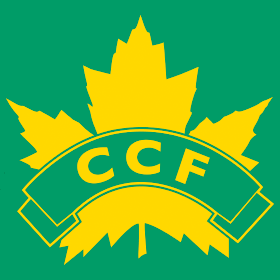Socialism is a political, social and economic philosophy encompassing a range of economic and social systems characterised by social ownership of the means of production and workers' self-management of enterprises. It includes the political theories and movements associated with such systems. Social ownership can be public, collective, cooperative, or of equity. While no single definition encapsulates many types of socialism, social ownership is the one common element. Socialists disagree about the degree to which social control or regulation of the economy is necessary; how far society should intervene and whether government, particularly existing government, is the correct vehicle for change.

The Co-operative Commonwealth Federation (CCF) was a social-democratic and democratic socialist political party in Canada. The CCF was founded in 1932 in Calgary, Alberta, by a number of socialist, agrarian, co-operative, and labour groups, and the League for Social Reconstruction. In 1944, the CCF formed the first social-democratic government in North America when it was elected to form the provincial government in Saskatchewan.

The International Socialists is a Canadian socialist organization which is part of the International Socialist Tendency. The IS in Canada publishes Socialist Worker, an English-language monthly paper, and holds an annual Marxism conference every spring in Toronto.

David Lewis was a Canadian labour lawyer and social democratic politician. He was national secretary of the Co-operative Commonwealth Federation (CCF) from 1936 to 1950, and one of the key architects of the New Democratic Party (NDP) in 1961. In 1962, he was elected as the Member of Parliament (MP), in the House of Commons of Canada, for the York South electoral district. While an MP, he was elected the NDP's national leader and served from 1971 until 1975. After his defeat in the 1974 federal election, he stepped down as leader and retired from politics. He spent his last years as a university professor at Carleton University, and as a travel correspondent for the Toronto Star. In retirement, he was named to the Order of Canada for his political service. After suffering from cancer for a long time, he died in Ottawa in 1981.
The Waffle was a radical wing of Canada's New Democratic Party (NDP) in the late 1960s and early 1970s. It later transformed into an independent political party, with little electoral success before it permanently disbanded in the mid-1970s. It was generally a New Left youth movement that espoused Canadian nationalism and solidarity with Quebec's sovereignty movement.
James Robert Laxer, also known as Jim Laxer, was a Canadian political economist, historian, public intellectual, and political activist who served as a professor at York University. Best known as co-founder of the Waffle, on whose behalf he ran for the leadership of the New Democratic Party in 1971, he is the author of more than two dozen books, mostly on Canadian political economy and history.
The New Brunswick New Democratic Party is a social-democratic provincial political party in New Brunswick, Canada linked with the federal New Democratic Party (NDP).
The International Left Opposition (Trotskyist) of Canada, the Workers Party of Canada, Socialist Policy Group, Socialist Workers League, Revolutionary Workers Party, The Club, the Socialist Education League and Socialist Information Centre, and the League for Socialist Action were successive Trotskyist organisations in Canada.

The New Democratic Party Socialist Caucus is an unofficial left-wing faction within Canada's New Democratic Party.
Melville Henry Watkins was a Canadian political economist and activist and professor emeritus of economics and political science at the University of Toronto. He was a founder and co-leader with James Laxer of the Waffle, a left-wing political formation within the New Democratic Party that advocated an "independent socialist Canada" and Canadian nationalism. He was appointed a Member of the Order of Canada in 2019.
Cy Gonick is a former politician in Manitoba, Canada. He was a member of the Legislative Assembly of Manitoba from 1969 to 1973, sitting as a member of the New Democratic Party.
The Socialist League was a Canadian Trotskyist group formed in 1974 by Ross Dowson and approximately twenty other former members of the League for Socialist Action after their faction was defeated at the 1973 LSA national convention. Dowson had previously been the leader of the LSA. The group published a newspaper, Forward and soon became better known as the "Forward Readers Group" or the "Forward Group".
It is not entirely evident who first used the branch plant economy concept; however, it has been extensively used in Canadian and UK literature since the 1970s. This concept broadly describes the negative consequences on the growth of the regions whose economies are primarily composed of branch plants that belong to multi-plant firms. Since the position of branch plants within the command chain is low, the regions that host these branch plants tended to be remotely controlled by the plant headquarters, which are usually located distantly. Authors at that time thought that branch plants might create a short-term boom in the regional economies when initial investments were deployed, or when they performed well owing to external factors such as the sector's expansion. That boom, however, did not sustain itself over the long term.
Joe Flexer was a trade unionist and communist activist in Canada. Born in Brooklyn, Flexer was politicized in the mid-1940s through contacts with the American Communist Party in New York City. He left the United States, a Zionist, in 1950 at the age of 17 with the Habonim Zionist youth movement and immigrated to Israel where he lived in Kibbutz Urim.

Socialism in Canada has a long history and along with conservatism and liberalism is a political force in Canada.

The 1971 New Democratic Party leadership election was a leadership convention held in Ottawa from April 21 to 24 to elect a leader of the New Democratic Party of Canada. Tommy Douglas retired as federal leader, and David Lewis was elected as his successor. At this convention the Waffle faction was at the zenith of its popularity and power. Donald C. MacDonald, the former Ontario NDP leader, was elected as the party's president. The major non-leadership issues were what stance would the party take in terms of Quebec sovereignty and whether policy initiatives calling for the nationalization of the oil, gas, and mining industries would pass.
Patrick Michael Callaghan was a politician in New Brunswick, Canada who was briefly leader of the New Democratic Party of New Brunswick.
J. Albert Richardson was a trade unionist and politician who was leader of the New Brunswick New Democratic Party from 1970 until 1976 save for a one-month interruption in late 1971.
The Left Caucus was an Ontario-based left-wing pressure group within the New Democratic Party of Canada and the Ontario New Democratic Party from the late 1970s to early 1990s.

The Leap Manifesto is a Canadian political manifesto that was issued by a coalition of environmentalists, Indigenous and labour leaders, authors, and artists in September 2015 in the context of the Canadian federal election campaign. The document, which launched with the backing of approximately 100 prominent signatories and attracted more than 10,000 signatures the day of its release, focuses on addressing climate change through a policy framework that restructures the Canadian economy and also addresses issues of wealth and income inequality, racism, and colonialism.





